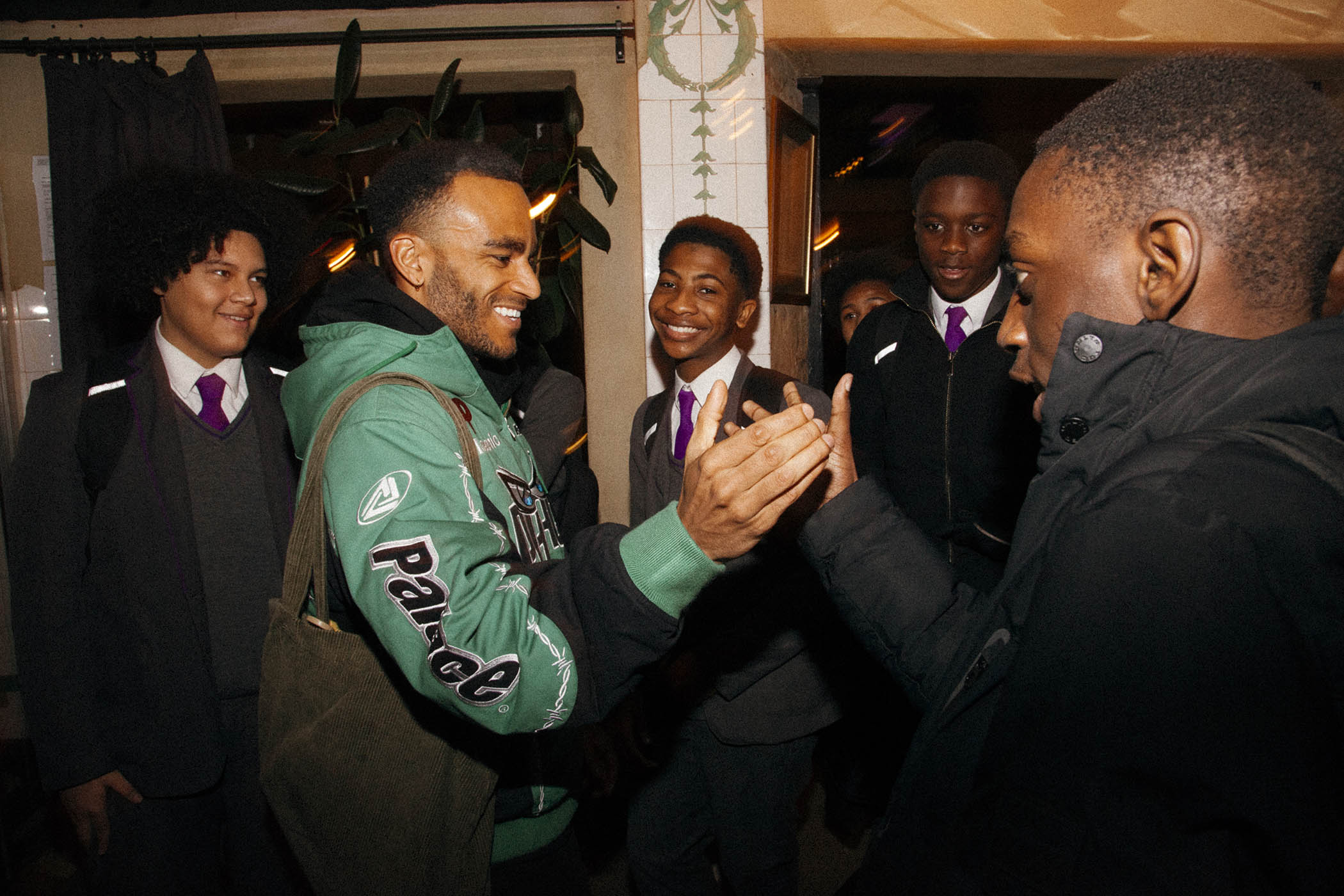Photography by Paul Stuart
The LA meetings for Al-Anon, a 12-Step group for friends and families of addicts, were in the Valley, and it felt emotionally correct to descend towards the sessions, the freeway becoming dotted with banks of tall trees as you got closer to the church hall. I’d sift intractable sorrows with strangers before heading back uphill, watching the trees thin out and become, again, the gas stations of Ed Ruscha paintings. I thought of this as stars changing backstage before returning to their real lives.
I moved back to the UK a year later, immediately finding it harder to connect in the London meeting halls. The geography felt reversed. It didn’t seem right, problem solving in small dark rooms and then heading back home to the green, expansive views of my top-floor flat. Though I’d often felt the LA meetings had kept me from going under, my attendance at the UK meetings soon dwindled and then ended.
Living in London I remained in contact, however, with my American sponsor. She had approached me at my first meeting after hearing me share, to welcome me into the fellowship and volunteer herself as my sponsor. I didn’t realise until much later that she embodied two things that have always been my Achilles heel: she was very beautiful and she offered praise, telling me what a fan she was of my last book and how much it had meant to her. A core tenet of 12 Step is that your identity is supposed to be anonymous. If you recognise someone, you don’t go up and tell them. Ignoring this rule was a red flag, if not about her then about myself.
My sponsor embodied two things that have always been my Achilles heel: she was very beautiful and she offered praise
My sponsor embodied two things that have always been my Achilles heel: she was very beautiful and she offered praise
But fame can bend time and reason, especially in 12 Step. It is, within the church antechambers, osmotic: the extremely famous get back the anonymity they’ve not had access to in decades (or that anonymity is pantomimed for them). And non-celebrities can become starry within 12 Step. Being famed in the network as a shining example of how well the programme works is common in big cities, attracting hoverers just as a movie star would. In Los Angeles particularly the 12-Step network can feel like a whole shadow city to Hollywood, with its own gatekeepers. I’d witnessed this in action when I rented a guest house from an actor who was in the programme. When he was away filming, his sponsor would show up and use the pool, blast music whilst I was trying to write or worse, place himself in the middle of an al fresco lunch I’d laid out for a date. My rent always timely and my patience wearing thin, I called my landlord and asked, was it possible to have his sponsor check with me before he came over? After he passed on the message, his sponsor shouted at me so loudly I had to hold the phone away from my ear. The inference was: he’d saved the actor’s life and could therefore intrude on mine
My sponsor didn’t save my life but she allowed me to ride the coattails of her faith in me. She’d presented herself, despite her ethereal appearance, as a no-nonsense optimist. I sometimes found I could not come to a decision without clearing it with her first. She was incredibly kind to me over the years, remaining available as a sounding board through my transition back to my previous life in the UK, where I grew up.
The addict in my life still dominated my thoughts. Imagining how to avoid discord with them would keep me up at night. That’s when I’d reach for her guidance, knowing it was daytime in the US, finding that a sense of light and possibility could be transmitted by phone. “You are not to be trusted,” the addict would tell me, sweating through their clothes; on the phone my sponsor reassured me I was trustworthy and loving.
During the pandemic, however, four years after I met my sponsor in the LA hall, there came two parallel changes: the addict began to be even more erratic and my sponsor started to post curious things online. There was the person she was when she’d thoughtfully reach out after not hearing from me for a while. Then there was the person she’d become on social media. One day, scrolling through her Instagram posts I saw regrams of a Black Lives Matter activist accused of fraudulent fundraising by families who never received donations that had been raised in their name. This made me increasingly uncomfortable, but I pretended I hadn’t seen them, because I needed to trust her judgment.
I think the appeal of doing the right thing and being an upstanding person is often what draws a social media user down darker corridors. This prominent BLM activist was soon banned from Instagram for life, something I tentatively flagged with her. Well, she said, that’s only because of who controls it. (You’ll be astonished when you find out which ethnic group controls the media! It’s the Irish. Just kidding, it’s the Jews. This is a lot of responsibility. No wonder some of us have issues that could land us in 12 Step.)
The gap between the care with which she treated me and the carelessness of her accusations against Jews increased. In our family system, the addict always held one of us accountable for their misfortune. Their ex-girlfriend might be defined as the source of their problems for about a year before they moved over to someone else. The rest of us would try to keep our heads down and hope it wasn’t us, and if it was, just try to ride it out until we were forgiven.
The ultimate conclusion of 12 Step is that there is no one to hold to account for your problems but yourself. It was hard to make sense of my wise and kind sponsor deciding the world’s ills were the fault of a minority ethnic group – and my own at that. One day, she posted a demonstrably inaccurate comment on my Instagram, saying the Jewish people did not originate in the Middle East. I couldn’t ignore it any more. I’d have to deal. And I had ended up in a position of needing a 12-Step group in the first place because I was so bad at dealing.
‘I cannot talk with you about this,’ I wrote. ‘I need you to respect this boundary’
‘I cannot talk with you about this,’ I wrote. ‘I need you to respect this boundary’
I took a breath and called her, immediately feeling like I was trying to reason with the addict. She pushed back, hanging up then texting me “evidence”, from a 70s Soviet disinformation campaign that pops up everywhere from the Islamic Republic of Iran mullahs to the feeds of wellness influencers. “I cannot talk with you about this,” I wrote back. “I need you to respect this boundary.” Talk of boundaries turns 12-Step types into Pee Wee Herman (“I know you are, but what am I?”); we went back and forth about which of us had overstepped. I felt nauseous, like I did when my addict hissed: “You are not to be trusted.” The moment I recognised that feeling, I blocked her. The 12 Steps helps you sit in difficult feelings. I had learned that, in the year going back and forth to the valley. But this walking away worked well, too.
Eight years she’d been my sponsor and now she sent a DM, circumnavigating WhatsApp: “You are a coward and a bad friend.” She’s right – if we were friends, I was a horrible one. Every time we got on the phone, I always talked about myself and never asked about her problems. But that is the function of a sponsor. I sifted over our years together. Had she at some point stopped being my sponsor and become my friend? I felt unconvinced. Still, I felt her pain. The next question we ask ourselves after “Who am I?” is “What are we to each other?” She’d thought we were friends and I hadn’t.
The last message she sent before I blocked her: “When I saw you didn’t thank me in the acknowledgements of your book, I cried. I saw you had space to thank your famous friends. How telling that is about you.”
Reaching to my shelf, I opened my book, where her name appeared in the thank yous, plain as day. Now that is conspiracy theory. I was going to post the book to her, her name circled, but there is no proving to someone who doesn’t trust you. Not where you come from. And not your own private soul.
I thought of all the times I got it wrong about what I was to someone, especially people in Los Angeles, like my agent who I received a birthday gift from every year until I stopped making the agency enough money. This is even harder to decipher when two people come together in a group like Al-Anon because they are vulnerable, wounded and have demonstrated poor decision-making skills. But the trees become gas stations and the truth remains: that person was good to me, and meant something to me, and is lost to me.
Emma Forrest’s new novel Father Figure is published by W&N, £18.99. Order your copy at The Observer Shop
Newsletters
Choose the newsletters you want to receive
View more
For information about how The Observer protects your data, read our Privacy Policy


